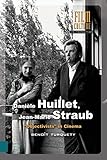Danièle Huillet, Jean-Marie Straub : "Objectivists" in Cinema / Benoît Turquety.
Material type: TextSeries: Film Culture in TransitionPublisher: Amsterdam : Amsterdam University Press, [2020]Copyright date: ©2020Description: 1 online resource (316 p.)Content type:
TextSeries: Film Culture in TransitionPublisher: Amsterdam : Amsterdam University Press, [2020]Copyright date: ©2020Description: 1 online resource (316 p.)Content type: - 9789048543069
- Experimental films -- France -- History and criticism
- AUP Wetenschappelijk
- Amsterdam University Press
- Art and Material Culture
- Film Studies
- Film, Media, and Communication
- Literary Theory, Criticism, and History
- Media Studies
- LITERARY CRITICISM / General
- Straub, Huillet, Cinema, Modernist Poetry, Zukofsky, Oppen
- 791.43022 23
- PN1995.9.E96 .T877 2020
- online - DeGruyter
| Item type | Current library | Call number | URL | Status | Notes | Barcode | |
|---|---|---|---|---|---|---|---|
 eBook
eBook
|
Biblioteca "Angelicum" Pont. Univ. S.Tommaso d'Aquino Nuvola online | online - DeGruyter (Browse shelf(Opens below)) | Online access | Not for loan (Accesso limitato) | Accesso per gli utenti autorizzati / Access for authorized users | (dgr)9789048543069 |
Frontmatter -- Contents -- Introduction -- Part One. Foundations -- 1. Erotic Barbarity: Othon -- 2. Objectivity and Objectivities -- Part Two. Language/Authority -- 3. The Power of Speech (or the Voice), of Seeing and the Path: Moses And Aaron -- 4. Speech against Power, or Poetry, Love, and Revolution: “A”-9 -- Part Three. Interruptions -- 5. Cinema, Poetry, History: Immobilizations -- Part Four. Trials, Series -- 6. Industrial Civilization for the Last Time: Class Relations -- 7. On Dissolution -- Conclusion -- About the Author -- Index
restricted access online access with authorization star
http://purl.org/coar/access_right/c_16ec
Danièle Huillet and Jean-Marie Straub collaborated on films together from the mid-1960s through the mid-2000s, making formally radical adaptations in several languages of major works of European literature by authors including Franz Kafka, Bertolt Brecht, Friedrich Hölderlin, Pierre Corneille, Arnold Schoenberg, Cesare Pavese, and Elio Vittorini. The impact of their work comes in part from a search for radical objectivity, a theme present in certain underground currents of modernist art and theory in the writings of Benjamin and Adorno as well as in the "Objectivist" movement, a crucial group within American modernist poetry whose members included Louis Zukofsky, George Oppen, and Charles Reznikoff, with connections to William Carlos Williams and Ezra Pound. Through a detailed analysis of the films of Straub and Huillet, the works they adapted, and Objectivist poems and essays, Benoît Turquety locates common practices and explores a singular aesthetic approach where a work of art is conceived as an object, the artist an anonymous artisan, and where the force of politics and formal research attempt to reconcile with one another.
Mode of access: Internet via World Wide Web.
In English.
Description based on online resource; title from PDF title page (publisher's Web site, viewed 25. Jun 2024)


